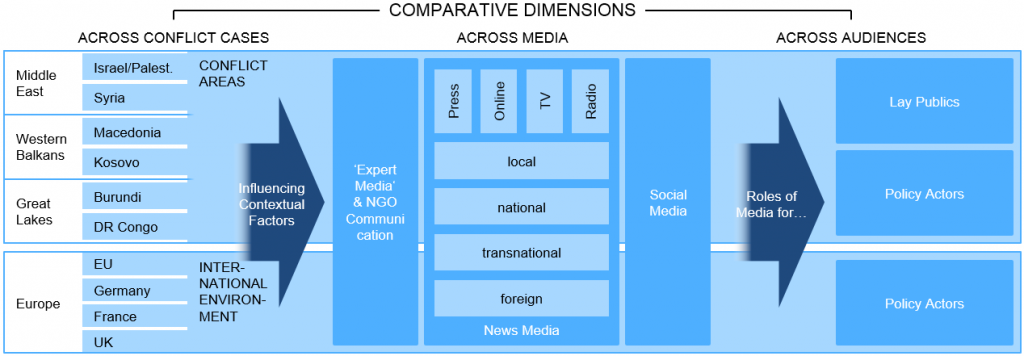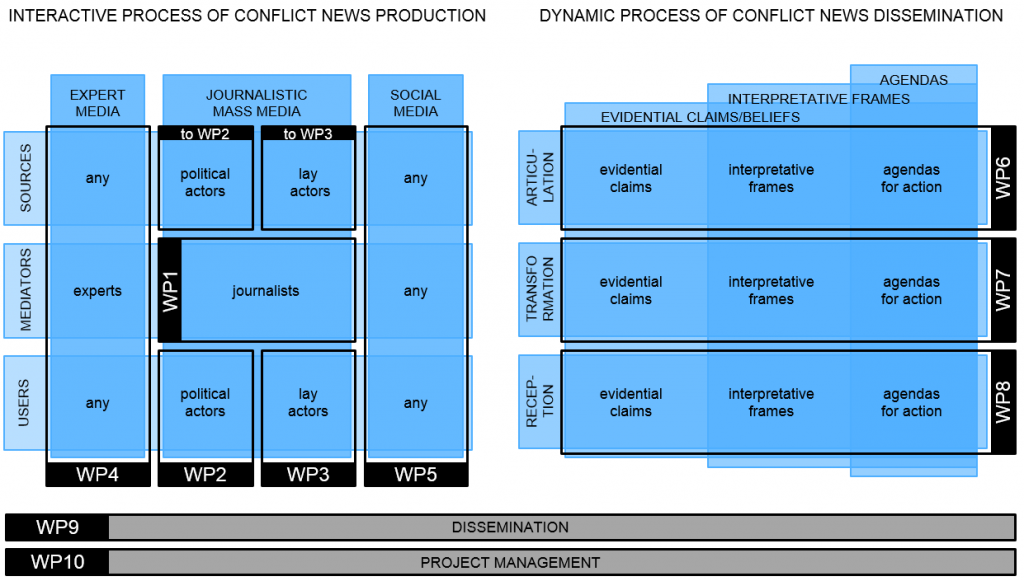Study
INFOCORE aims to uncover the dynamic, interactive processes underlying the production and dissemination of conflict-related media contents. Thereby, it addresses
INFOCORE pursues a comparative approach along multiple dimensions.
First, we compare across different conflict cases, varying conflict characteristics, international involvement, and conflict phases. All cases include both phases of escalation and de-escalation, and allow a systematic comparison revealing recurring patterns and case-specific idiosyncrasies. Specifically, we look at six conflicts located in three larger conflict areas:
Middle East
|
Western Balkans
|
African Great Lakes
|
In addition, we look at the reflection of these conflicts in selected European public and political spheres:
- Germany
- France
- United Kingdom
- European Union
Second, we compare the production and dissemination patterns across different kinds of media environments, each of which is shaped by its characteristic logics of news production and dissemination:
- Professional news media
- Social media
- Expert media (e.g., NGO publications, intelligence briefs, expert dossiers)
Third, we compare the role of media in conflict for the conflict perceptions and behavior of different kinds of media audiences:
- Lay Publics in the conflict areas
- Policy actors in the conflict areas
- Policy actors in the international environment.
INFOCORE focuses on the process character of conflict news production and dissemination.
Within the socially interactive process of media production, we address a wide range of actors (journalists, political actors, experts, business actors, lay actors, etc) that influence, or try to influence the news. Within this process, different actors can take in three characteristic roles:
- sources/advocates
- mediators
- users/audiences.
Within the dynamic, evolutionary process of conflict news dissemination, we furthermore analyze different stages in the collaborative construction of conflict interpretations. The various conflict interpretations advanced in a public debate undergo a recurring cycle of:
- the articulation and selection of information,
- the transformation of information into news,
- and the reception of conflict news content.
INFOCORE pursues an integrated, comparative research strategy that combines different perspectives, different kinds of data, multiple methodologies:
To address the roles of actors involved in the news production process, INFOCORE uses a combination of expert interviewing, focus group interviewing, and quantitative surveys.
To address the evolution of conflict interpretations represented in the conflict news dissemination process, INFOCORE uses a combination of discourse analysis, qualitative frame and narrative analysis, and the quantitative, computer-assisted content analysis of large scale text data.
INFOCORE applies an integrated methodological framework that defines the main strategies for sampling, data gathering, and analysis across the different Work Packages. Thereby, INFOCORE ensures maximum coherence and facilitates the comparative analysis of findings from different case studies.
INFOCORE presents the first systematically comparative, dynamic, process-oriented study of the role of media in violent conflict.


